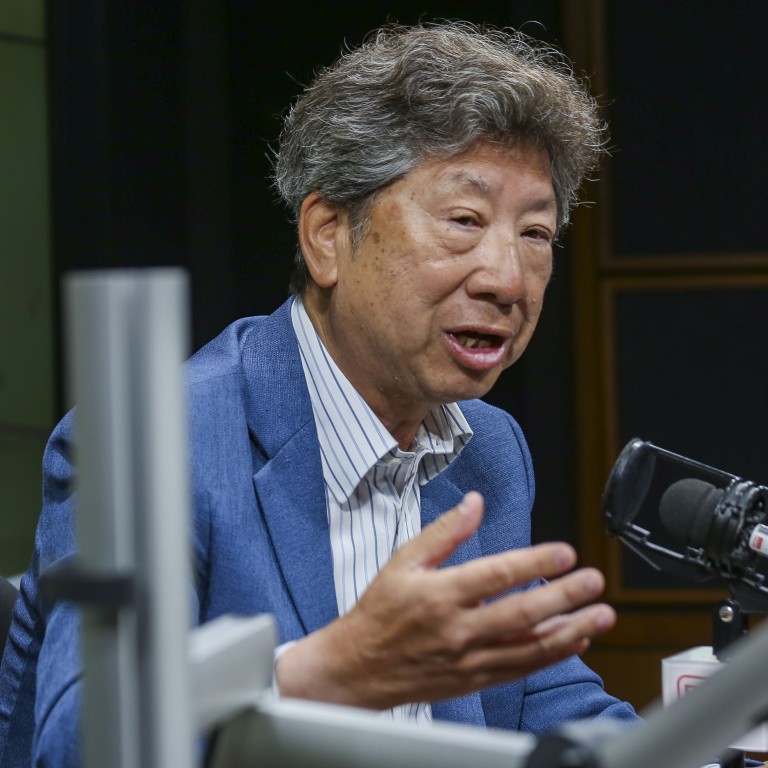
Coronavirus: ban public gatherings in Hong Kong rather than sale of alcohol in bars and restaurants, says senior government adviser
- Executive Council member Ronny Tong questions logic behind proposed ban
- Tong says socialising in public should be limited to groups of four for 14 days
Public gatherings of more than four people should be banned for 14 days instead of stopping alcohol sales in bars and restaurants to contain the coronavirus pandemic, a senior Hong Kong government adviser believes.
On Wednesday, Ronny Tong Ka-wah, a barrister who sits on the Executive Council, joined the chorus of voices questioning the effectiveness of stopping liquor sales to stop gatherings, as was suggested by Chief Executive Carrie Lam Cheng Yuet-ngor on Monday.
The catering industry, which has been hit hard by the outbreak, has reacted strongly to Lam’s idea and said there was no proof of a link between drinking and the spread of Covid-19.
That insistence came despite the fact at least 17 confirmed infections were recorded in the vicinity of Lan Kwai Fong, Hong Kong’s nightlife hub.

“If people don’t drink, but carry on with gatherings, that does not achieve the aim but causes a backlash; is it still worthwhile to press on with the ban on alcohol?” Tong said on a radio programme.
He said the law change proposed by Lam was just “scratching the surface” of the problem.
More drastic legislation, such as banning public gatherings, as Britain and Germany had done, were required to fundamentally stop people socialising, Tong said.
“Britain and Germany have banned public gatherings of more than two. That may be a bit harsh for a family of four in Hong Kong. But if we are still stuck with the issue of whether to sell liquor or not, that’s not the way out,” he said.
“We have to set a law so those gathering in public could not exceed a certain number, such as four.”
Hong Kong bars brace for alcohol-sales ban as Covid-19 surge continues
On the legality of such a law, be it banning alcohol sales or public gatherings, Tong said that under the Prevention and Control of Disease Ordinance, the chief executive had very broad powers, equivalent to emergency powers.
“Based on public safety and health, human rights have to give way to that,” he said.
But if stopping the sale of alcohol failed to discourage groups of people meeting in public, Tong said there could be a chance that such laws would be challenged on judicial review.
If the situation deteriorated further, Tong said a stricter curfew should be considered.
Asked why he was differing with Lam publicly, Tong said it was only healthy for diverging opinions to address the same problem.
“We have to accept different views are part of a civilised society – we’re not a communist regime that we could lock down the city in one day,” he said.
As of Wednesday morning, the city had reported 386 confirmed cases of Covid-19, with four deaths.
The city has also banned all foreign tourists and blocked anyone transiting through the airport for an initial 14-day period.
All Hong Kong residents arriving from overseas must stay at home for 14 days in self isolation, after a similar restriction was imposed on those returning from mainland China in February.
However, the government has admitted for the first time that the wristbands being worn by those in quarantine cannot detect whether a person has left their residence.
Victor Lam Wai-kiu, its chief information officer, walked back his previous claim on Wednesday.
“If the person only left their place without their phone, there is no signal from the band [triggered],” Lam said.
The only point in using the wristband, Lam added, was that a separate smartphone app, which has location-sharing functions, would randomly request scanning of a QR code from the band.
While Lam claimed the entire regime was still effective, the government would bring in new wristbands with a Bluetooth connecting function. This would start with residents returning from Europe and the United States, Lam said.
Purchase the China AI Report 2020 brought to you by SCMP Research and enjoy a 20% discount (original price US$400). This 60-page all new intelligence report gives you first-hand insights and analysis into the latest industry developments and intelligence about China AI. Get exclusive access to our webinars for continuous learning, and interact with China AI executives in live Q&A. Offer valid until 31 March 2020.

